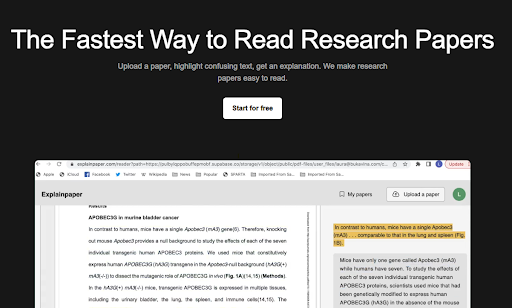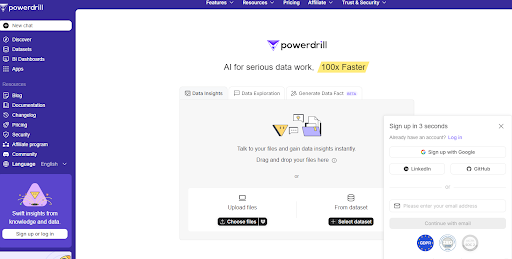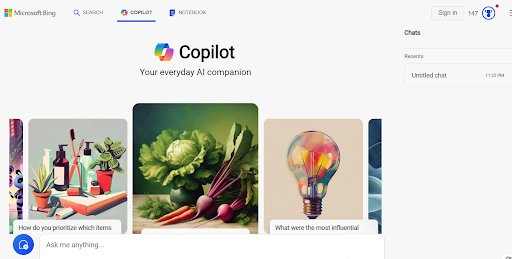2024 Twelve Best FREE AI tools for Academic Research and Researchers
2024 Twelve Best FREE AI tools for Academic Research and Researchers
Introduction
As AI technology continues to advance, many tools have evolved to become indispensable in various fields—from research to content creation. However, with so many options on the market, many of these tools come with a hefty price tag. Fortunately, there are powerful free AI tools available that can significantly enhance productivity without draining your wallet. In this blog, we'll explore 12 of the best free AI tools in 2024, highlighting their features, pros, cons, and where you can find them.
1. Urisa
Overview:
Urisa is an AI-driven tool designed for mind mapping and research exploration. It's perfect for visualizing complex ideas and organizing research topics into structured formats. Whether you're starting a literature review or mapping out a research project, Urisa helps you lay out your thoughts clearly and efficiently.
Pros:
- AI-Driven Insights: Automatically generates content and connections based on your input
- User-Friendly Interface: Easy to navigate with a clean and intuitive design.
- Completely Free: No hidden costs or subscription plans.
Cons:
- Limited Advanced Features: While excellent for basic mind mapping, it may lack depth for more complex research needs.
- Not Scholarly-Focused: Does not delve into scholarly databases, which may limit its use in academic research.
2. Open Read
Overview:
Open Read is an AI tool designed for researchers who need to digest large academic papers quickly. It offers features like Paper Espresso, which provides bite-sized summaries of complex papers, and AI-generated Q&A.
Pros:
- Generous Free Plan: Offers five free uses per month for various features.
- AI-Powered Summaries: Quickly get the gist of lengthy academic papers.
- Interactive Q&A: Ask specific questions about papers and get concise answers
Cons:
- Limited Monthly Usage: The free plan may not be sufficient for heavy research needs
- Not Always Accurate: AI summaries and Q&A may sometimes lack precision, requiring manual verification.
3. Explain Paper
Overview:
It Explain Paper simplifies academic papers by breaking down complex text into understandable chunks. This tool is particularly useful for students and researchers who need to comprehend challenging material.
Pros:
- Completely Free: No cost to use any of the features.
- Multiple Explanation Levels: Choose from explanations tailored to different educational levels, from 5-year-olds to undergraduates.
- Easy to Use: Simply upload a paper and select the text you want to explain.
Cons:
- Basic Features: Limited to text explanation without additional research tools.
- Potential Over-Simplification: May not always capture the nuances of highly technical content.
4. Paper Brain
Overview:
Paper Brain is an AI tool that helps users understand academic papers by answering specific questions about them. It provides concise, AI-generated summaries and explanations, making complex research more accessible.
Pros:
- Free to Use: All features are available at no cost.
- Quick Answers: Get instant responses to questions about papers.
- User-Friendly: Simple interface that is easy to navigate.
Cons:
- Limited Depth: The tool might oversimplify explanations, making it less useful for advanced research.
- Dependent on Input Quality: The quality of responses can vary depending on the clarity of the questions asked.
5. Einblick
Overview:
Einblick is a chart generation AI that allows users to create visual representations of their data quickly. It's particularly useful for researchers and data scientists who need to visualize their findings in a comprehensible format.
Pros:
- Ease of Use: Generate charts with just a few clicks.
- Multiple Formats: Supports various types of charts and visualizations.
- Free Plan Available: Offers significant functionality without cost.
Cons:
- Data Limitations: The free version may have restrictions on the size of datasets.
- Basic Visuals: The visualizations may not be as sophisticated as those produced by more advanced software.
6. Tavali AI
Overview:
Tavali AI acts as a research assistant, helping users find and summarize information on various topics. It is particularly useful for generating AI-driven research overviews without the risk of hallucination—where AI produces inaccurate or nonsensical data.
Pros:
- Custom Research Agents: Creates AI agents that conduct specific research tasks.
- Accurate Data Collection: Focuses on providing relevant and up-to-date information
- Free to Use: No cost involved in accessing its core functionalities.
Cons:
- Non-Scholarly Focus: Primarily pulls information from the web rather than academic databases.
- Basic User Control: Limited customization options for research parameters.
7. Power Drill
Overview:
Power Drill is an AI tool that allows users to analyze large datasets by uploading files and querying the data through an AI chatbot. This tool is ideal for researchers handling extensive data who need quick insights.
Pros:
- AI Chat Integration: Query your data using natural language.
- Supports Various File Types: Upload text, web pages, or files for analysis.
- Free Plan: Access basic features without payment.
Cons:
- Data Upload Limits: Free accounts have limited storage capacity.
- Simplistic Interface: May not offer the depth required for advanced data analysis.
8. Scispace (Typeset DoAI)
Overview:
Scispace, also known as Typeset DoAI, is a comprehensive research tool that helps users read and understand academic papers quickly. It offers AI-powered literature reviews, too-long-didn't-read (TLDR) summaries, and data extraction from PDFs.
Pros:
- TLDR Summaries: Quickly digest the main points of complex papers.
- AI Copilot: Assists with literature reviews and data extraction.
- Free to Use: Generous free plan with useful features.
Cons:
- Usage Limits: The free plan has a cap on the number of papers you can process.
- Less Accurate for Complex Data: The AI might struggle with extracting intricate details from highly specialized papers.
9. GetNext (Next Net)
Overview:
GetNext is an AI tool tailored for the drug and health research fields. It allows users to explore the latest literature, gene expressions, and drug-related data, making it invaluable for researchers in these fields.
Pros:
- Focused Research: Specifically designed for drug and health-related studies.
- Interactive Graphs: Visualize research results and literature connections.
- Completely Free: No cost associated with using its features.
Cons:
- Niche Use Case: Primarily useful for those in the drug and health industries.
- Limited Application: May not be relevant for research outside its focus areas.
10. ChatGPT
Overview:
ChatGPT is one of the most popular AI chatbots available today, known for its versatility and ease of use. Whether you need help with writing, research, or general information, ChatGPT is your go-to tool.
Pros:
- Wide Range of Applications: Useful for everything from casual queries to complex research.
- Constantly Updated: OpenAI regularly improves the model, enhancing its capabilities.
- Free to Use: Accessible to everyone without cost.
Cons:
- Potential for Hallucination: Sometimes provides inaccurate or overly general responses.
- Not Academic-Focused: While useful, it may not always provide the depth needed for scholarly work.
11. Perplexity
Overview:
Perplexity is an AI tool designed for those who need well-referenced and accurate responses. It is particularly useful for research purposes, where sources and citations are crucial.
Pros:
- Citations Included: Provides references for its responses, which is great for research.
- Free Access: No subscription required to use its features.
- Customizable Responses: Users can request more detailed or creative answers
Cons:
- Complex Queries May Confuse: Sometimes struggles with intricate questions.
- Not Always Reliable: Can still produce inaccurate information, requiring user verification.
12. Bing Chat
Overview:
Bing Chat integrates AI technology into the Bing search engine, allowing users to ask questions and receive detailed, contextual answers. It's particularly useful for those who need precise and balanced responses.
Pros:
- Multiple Response Modes: Choose between creative, balanced, and precise answers.
- Integrated Search: Seamlessly combines AI with traditional search engine result
- Free to Use: Accessible to all without cost.
Cons:
- Broader Focus: Not as specialized as other research-specific tools.
- Potential for Error: AI responses may sometimes be inaccurate or too broad.
Conclusion
These 12 free AI tools are game-changers make sure you make use of them.









Post a Comment